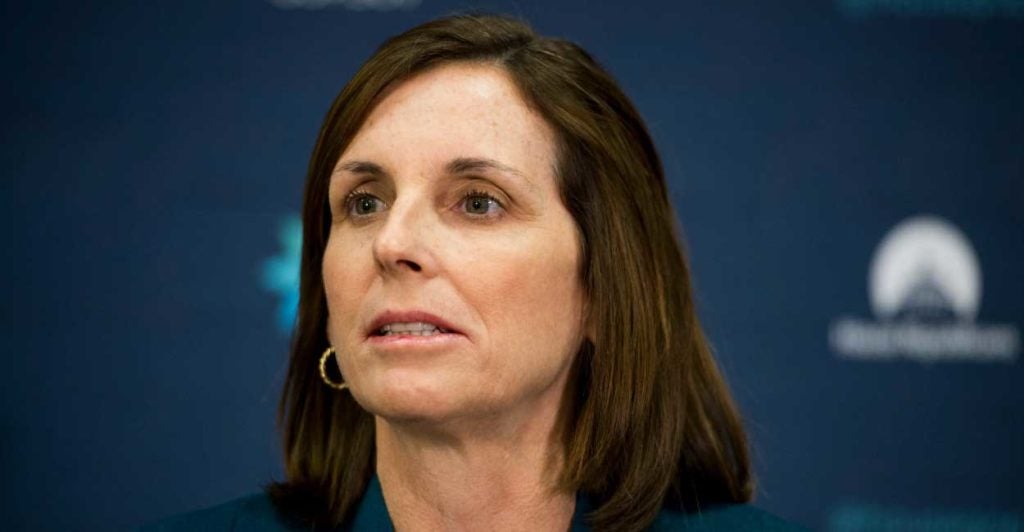What are the barriers women face in the economy today? A special congressional committee is addressing this question and getting to the heart of how women can succeed in the workforce and balance other life priorities.
On Sept.22, the Republican Policy Committee Working Group on Women in the 21st Century Workforce held its first hearing of many to understand the economic challenges and discrimination facing women.
Rep. Martha McSally, R-Ariz., who heads the working group, opened the hearing by declaring “our country is founded on the principle that we pick the best man for the job—even if she is a woman. It is time we made that idea a reality.”
The Obama administration has frequently touted that women are discriminated against, citing the statistic that women on average earn 77 cents for every dollar a man earns. Witnesses at the hearing exposed this gender wage gap as a myth, by pointing out that this raw statistic is quite misleading.
It does not account for numerous relevant factors that relate to a worker’s salary—including education, experience, choice of industry and occupation, career interruptions, and hours worked. When accounting for these factors, the wage gap shrinks to about 3 to 7 cents.
However, this small remaining gap doesn’t measure discrimination either. Some of it can likely be explained by women more often choosing employers who provide more of their compensation in the form of valuable benefits instead of in wages.
According to a Pew Research Center poll, 70 percent of working mothers value a flexible schedule. Mothers are 10 percentage points less likely than working fathers to value a high-paying job. Many women make a conscious trade off of giving up higher wages to spend more time with their family. Women express this by often going into occupations conducive to flexibility like pharmacy or nursing.
The gender wage gap is in part a result of such choices and not necessarily indicative of gender-based discrimination in the workplace.
Real challenges women face in the 21st century include barriers to workplace flexibility, expensive child care, and biases introduced by well-intended but harmful government policies.
A regulation that hurts flexibility in the workforce includes the Fair Labor Standards Act’s provision that prohibits granting compensatory time off in lieu of overtime pay to hourly workers. This policy deprives women of the valuable choice between higher wages and more time off.
Gig economy companies, like Uber and Airbnb, have led to an increase in flexible job opportunities since they allow women to set their own hours and to use capital assets like their car or home to earn extra cash. The government should not overregulate these companies.
The gig economy relies on independent contractors and self-employed individuals. Policies that discourage independent contractors should be repealed.
Independent contractor jobs provide women with the flexibility to set their own hours. An example of a public policy that discourages independent contracting is the Department of Labor’s 2015 Administrator’s Interpretation. The Administrator’s Interpretation broadly defines what an employee is under the Fair Labor Standards Act, leading to a decrease in workers who qualify as independent contractors.
Furthermore, child care costs have become increasingly more expensive. According to the The Wall Street Journal, “child care prices have risen nearly twice as fast as overall prices since … 2009.” These rising costs burden working mothers, especially single mothers.
A witness at the hearing, Samantha Tassone, president of GrowthFuel—a professional services organization focused on women’s leadership—interviewed a child care facility owner who explained his “expenses and costs [are] significantly affected by the regulatory agency … rising costs of minimum wage … [and] the Affordable Care Act.” The cost of government regulation is being passed on to parents in need of child care. These regulations should be repealed.
Another proposed policy, mandatory paid sick leave, would harm male and female workers. Mandatory paid sick leave lowers workers’ wages by forcing them to take time off in lieu of higher wages. This reduces workers’ choices. With women being more likely than men to use paid leave for caregiving responsibilities, this could further harm women on the job market.
Paid leave and minimum wage policies are perfect examples of government policies aimed at helping women, but have unintended, negative consequences. Government mandated one-size-fits-all policies destroy the choices and flexibility that women want.
Congress should instead remove costly employee mandates and regulations. This, along with tax reform and removing barriers to entry, will create a strong economy. A strong economy creates opportunities and choices that benefit all Americans, including women.
